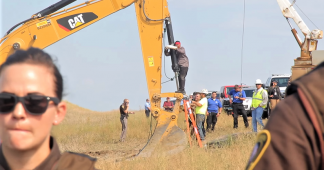6 Jul, 2020
A legal challenge has at least temporarily achieved what months of protests through a frigid North Dakota winter couldn’t pull off: shutting down a controversial oil pipeline that crosses key bodies of water in the region.
The 570,000 barrels-a-day Dakota Access Pipeline must be idled and drained within 30 days for an environmental assessment that should have been done before the US Army Corps of Engineers granted an easement for the conduit to pass under Lake Oahe, the US District Court for the District of Columbia ruled today. Barring a successful appeal to a higher court, the decision will result in an extended disruption to oil shipments. The Corps of Engineers has said it will take about 13 months to do the required environmental review.
The pipeline has been a lightning rod for controversy, pitting the Standing Rock Sioux Tribe and environmental groups against project developer Energy Transfer Partners and the administration of President Donald Trump. Protesters camped for months on federal lands through the winter of 2016-2017 to block the project’s completion, saying the pipeline would endanger the drinking water sources of the Standing Rock Sioux reservation. Clashes escalated to the point that police reportedly fired tear gas and rubber bullets and soaked advancing protesters with a water cannon in freezing temperatures.
The Trump administration saw the pipeline as a key tool in achieving US energy independence by providing a way to efficiently transport more oil from the prolific Bakken shale formation to US Midcontinent and Gulf Coast refineries. Its start-up was delayed until June 2017 from 2016 when the Corps of Engineers called for further review amid the protests in the waning days of the Obama administration.
Energy Transfer says the underground Dakota Access line is buried at least 95 feet below the lakebed and is one of at least nine pipelines that cross Lake Oahe. It surpasses federal safety requirements, the firm says, and unlike some of the rail cars that transport Bakken oil, it doesn’t cross the Standing Rock Sioux reservation.
Today’s court decision marks a setback for both the Trump administration and the US petroleum industry which is already reeling from a collapse in crude prices brought on by the Covid-19 pandemic that led to production cuts in the Bakken formation.
The latest legal decision comes amid a wave of successful challenges by environmental groups that have blocked permits for at least three major pipeline projects this year in US courts. One such victory prompted utility companies Dominion Energy Corp. and Duke Energy Corp. to say on July 5 that they will no longer pursue their long-delayed Atlantic Coast natural gas pipeline project. Dominion also announced the sale of its pipeline and gas storage assets to Warren Buffett’s Berkshire Hathaway Inc. for $4 billion.
The Sierra Club said that in the wake of today’s ruling, Energy Transfer should abandon its plans to nearly double the Dakota Access Pipeline’s capacity to 1.1 million barrels a day. “Today’s ruling is a testament to the perseverance of the Standing Rock Sioux, who have refused to give up the fight to protect their water from this dirty oil pipeline,” the environmental group said. “This pipeline was a terrible idea when the Trump administration allowed it to be constructed, and amid crashing oil demand, it makes less sense than ever to put critical water resources at risk for the sake of oil no one needs.”











